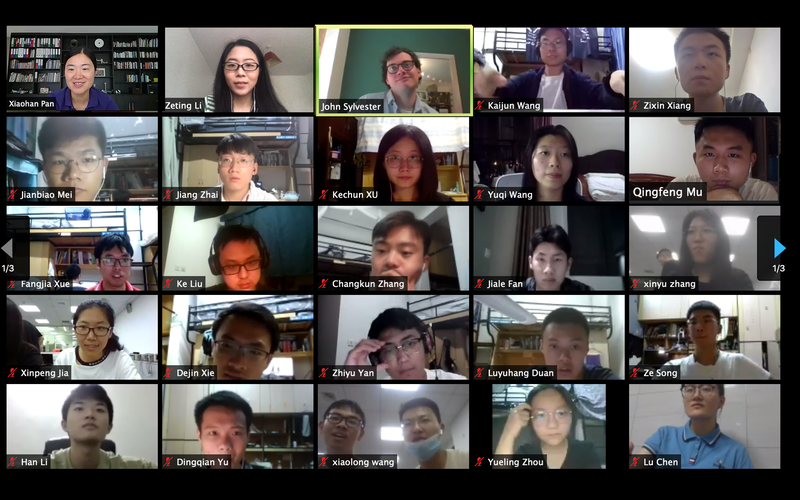
Xiaohan Pan's Cantab Academy has moved its Zheijiang/Cambridge university collaboration online this summer
The successful delivery of online programmes has proven that new telecommunication technologies have empowered us to provide more intelligent and, surprisingly, more interactive courses at a much lower cost to a much wider community that we haven’t been able to reach before.
Xiaohan Pan
An education company which links Cambridge and Zheijiang universities and was set up by a Gates Cambridge Scholar has made a successful move to online delivery over the summer, running a course in Algorithms for Machine Learning for 60 students from China.
Cantab Academy, founded by Gates Cambridge Scholar Xiaohan Pan, designs and organises short-term training courses and visits to the leading institutions in the UK for aspiring people in emerging countries, with the main focus being on China.
It runs an undergraduate partnership programme between Zhejiang University and the University of Cambridge to promote mutual understanding and potential cooperation between undergraduates in these two leading universities.
Zhejiang University (ZJU), hailed as “Cambridge of the East” by Professor Joseph Needham, is one of China’s leading universities. It operates a “Go Global Initiative” framework, which has shifted towards online education since the coronavirus outbreak, with more online collaborations and courses.
This fits with Cantab Academy’s new Internet-based programmes, which, Xiaohan says, have also been specially designed to reflect and address the needs and concerns of modern societies. The subjects taught over the summer ranged from Artificial Intelligence and Integrated Immunology to the Politics of Globalisation.
The Algorithms for Machine Learning programme ran for two hours a day between 4th and 19th August and 60 second and third year undergraduates from the College of Control Science and Engineering at Zhejiang University took part. The course consisted of eight lectures, a final assessment and a Cambridge application seminar. Speakers included a Cambridge lecturer and Research Associate and a Kings College London lecturer. A postgraduate student at University of Cambridge led the Cambridge application seminar.
The course aimed to introduce students to the basic principles and methods of machine learning algorithms and covered a selection of the most important machine learning algorithms for supervised, unsupervised and reinforcement learning. In addition students had to analyse their performance in terms of learning accuracy and computation cost and discuss how to apply them to concrete real-world problems such as face detection, network clustering, spam classification and movie recommendations. It was designed to be very interactive, with quizzes and polls used to check students’ understanding.
One student, Hongxu Zhao, remarked: “The student-oriented teaching approach made me feel surprised and delighted, which in return earned my full attention and improved my learning outcome. I really enjoyed the group work. Collaborating with my group mates to prepare for the final assessment helped me deepen my understanding of the concepts of machine learning. All in all, I am impressed that I am able to learn so much from a two-week online course.”
Professor Dibo Hou, Deputy Dean of the College of Control Science and Engineering at Zhejiang University, said the course not only presented high quality online teaching resources on AI technology, but also expanded students’ international horizons.
Dr John Sylvester, Research Associate at Cambridge’s Department of Computer Science and Technology assessed student presentations at the end of the course. He said: “It was evident that not only had the students learnt and understood the contents of the course, which covered a range of different machine learning algorithms and theory, but that they had then successfully applied this knowledge to analyse real world data.”
Xiaohan [2005], who did her PhD in Biotechnology and describes herself as a “serial entrepreneur”, says she thinks online learning will never fully replace the face to face learning experience, but feels the online course is an important addition to Cantab Academy’s offering. She said: “The successful delivery of online programmes this summer has proven that new telecommunication technologies have empowered us to provide more intelligent and, surprisingly, more interactive courses at a much lower cost to a much wider community that we haven’t been able to reach before. I feel very excited about this development, and we have been putting tremendous effort into expanding our portfolio and optimising our infrastructure in this area.”












